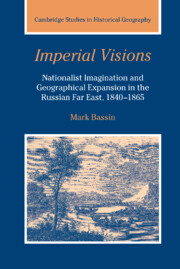 Imperial Visions
Imperial Visions Published online by Cambridge University Press: 06 July 2009
The death of Nicholas I in 1855 and the accession of his son Alexander, framed as they were against the background of defeat in the Crimean War, heralded the dawn of a very new era for Russia and at the same time marked one of the decisive turning-points in its modern history. The disastrous outcome of the war appeared to confirm beyond any question the damage which 30 years of Official Nationality had done, not only in regard to Russia's military capabilities vis-à-vis the West, but more fundamentally to its underlying economic, political, and social structure. Disillusionment with the ancien régime was indeed so strong that many thoroughly patriotic Russians actually cultivated a kind of resigned defeatism during the course of the war and viewed its unfortunate outcome as a perversely appropriate and necessary climax to the entire sad period. The historian Sergei Solov'ev, for example, recalled his deep ambivalence at hearing the news that Sevastapol had fallen to the enemy. While his patriotic feelings were “terribly injured by this humiliation of Russia,” he explained, at the same time he believed that “only disaster, and precisely military defeat, would be able to bring about the saving transformation and put an end to further decay. We were convinced that success on the battlefield would only draw our fetters yet tighter.” “I am glad, glad that we have been beaten,” the Decembrist N.R. Tsebrikov tearfully confessed on the same occasion: “Now we shall wake up.
To save this book to your Kindle, first ensure [email protected] is added to your Approved Personal Document E-mail List under your Personal Document Settings on the Manage Your Content and Devices page of your Amazon account. Then enter the ‘name’ part of your Kindle email address below. Find out more about saving to your Kindle.
Note you can select to save to either the @free.kindle.com or @kindle.com variations. ‘@free.kindle.com’ emails are free but can only be saved to your device when it is connected to wi-fi. ‘@kindle.com’ emails can be delivered even when you are not connected to wi-fi, but note that service fees apply.
Find out more about the Kindle Personal Document Service.
To save content items to your account, please confirm that you agree to abide by our usage policies. If this is the first time you use this feature, you will be asked to authorise Cambridge Core to connect with your account. Find out more about saving content to Dropbox.
To save content items to your account, please confirm that you agree to abide by our usage policies. If this is the first time you use this feature, you will be asked to authorise Cambridge Core to connect with your account. Find out more about saving content to Google Drive.